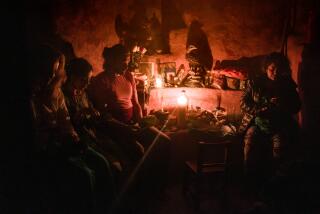Vietnam Turns to Traditional Medicine
- Share via
HANOI — With venomous snakes and scorpions, needles and herbs, impoverished Vietnam is providing alternatives to costly Western medicine.
Traditional cures are giving way to modern practice elsewhere in Asia, but Vietnam has made herbal potions, snake balms and acupuncture integral to its overtaxed medical system.
It is good business for Tran Nhu Ban, the self-styled “richest snake man of the north.” Clutching a squirming tangle of deadly banded kraits on his snake farm near Hanoi, he explained that python fat taken as a liquid or fried with rice is effective against asthma and that python bile soothes burns.
Various tonics are produced from reptile bones and blood, even by stuffing entire snakes into bottles filled with herbs and liquid.
Snake farms are multiplying, with official encouragement. Ban, 26, said he makes a good living by selling his medications to Vietnam’s state enterprise for traditional medicine and to neighboring China.
Some Vietnamese folk remedies and tonics, especially those said to increase sexual prowess, are dubious at best, but others have been effective for centuries and are the subject of continued scientific study.
For example, the Ecological and Biological Resources Institute is cultivating hundreds of black and brown scorpion species, extracting their venom twice a month with the help of electric stimulus.
The official Vietnam News Agency said the venom is used to treat skin diseases, glaucoma and some nervous disorders.
Dr. Nguyen Tai Thu, director of the Vietnam National Institute and Hospital of Acupuncture, said traditional methods fill gaps in the health system and are generally cheaper than Western equivalents.
In some parts of the country, herbal cures are a necessity because even such basic Western medicines as antibiotics are either not available or are too expensive for peasants.
With only one doctor for every 3,100 people, hospitals dating to colonial times and a meager budget for medical needs, Vietnam has staggering health problems.
Official statistics say 1 million Vietnamese children are handicapped and half of the 21 million who live in rural areas are malnourished.
Last year, 96% of the elderly were said to be in mediocre or poor health. Tens of thousands of invalids from half a century of war receive little or no care.
Thu, who was trained in Western medicine, said every major hospital in Vietnam has an acupuncture and traditional medicine section.
His 11-year-old institute treats about 500 patients a day in addition to conducting research and courses in acupuncture for both Vietnamese and foreigners.
Acupuncture treatment costs 30 to 40 cents a day, compared to $100 or $200 for a surgical procedure, Thu said.
He said he has successfully treated various nervous disorders, and enabled abdominal and other operations to be performed without anesthesia, by using acupuncture needles attached to a 9-volt battery.
Overweight women have lost several pounds after a month of treatment, Thu said, and smokers and drug addicts have been weaned from their addictions.
“Modern hospitals can’t treat some of them, so they send them to us,” the 61-year-old doctor explained during a tour of wards for patients who live permanently in the institute’s compound.
A special dormitory holds children with meningitis, cerebral paralysis or encephalitis. Others are hearing impaired, blind or severely malnourished.
Thu proudly displayed a photo album showing children before and after acupuncture. It was a gallery of near-skeletons transformed into seemingly healthy youngsters.
More to Read
Sign up for Essential California
The most important California stories and recommendations in your inbox every morning.
You may occasionally receive promotional content from the Los Angeles Times.










